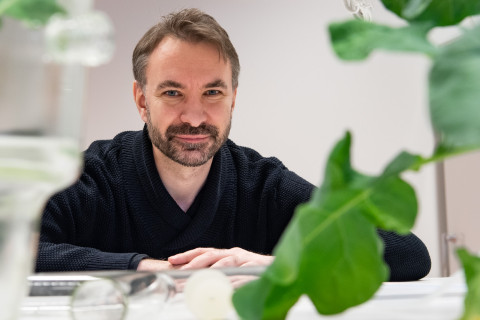New chemical ecology insights can open up many new avenues for research and potential entrepreneurship
“In the wake of climate change and excessive environmental pollution, it is vital to develop new methods for effective agricultural and horticultural practice,” James Blande, Professor of Chemical Ecology, says.
“Chemical Ecology is the study of interactions between organisms that are mediated by chemicals. It is a diverse field that is highly important to understanding the mechanisms underpinning ecosystem function,” Blande says.
“Many organisms defend themselves with chemicals and communicate with other organisms through scent. Examples include the attraction of pollinators to strongly scented flowers, the pheromone-mediated mating behaviours of insects, and the information transfer from damaged to undamaged plants.”
Understanding these interactions, how they function and their ecological significance, is fundamental to chemical ecology.
“We essentially work to decipher the odorous language through which organisms send and receive information. It is important to study chemical ecology, not only to better understand how ecosystems function and the complex effects of human activity on the environment, but in order to manipulate the behaviours of pest and beneficial insects in a safe and sustainable way.”
Blande did his PhD in chemical ecology at Rothamsted Research, which is a prestigious agricultural research station in the UK. His research was on the chemical ecology of aphid parasitoids, and he was supervised by two leading figures in the field Prof. Guy Poppy and Prof. John Pickett.
“After completing my PhD I began a postdoctoral position at the then University of Kuopio working under the guidance of Prof. Jarmo Holopainen. This was a key turning point in my career, as it enabled me to combine research on chemical ecology with work on plant ecophysiology and ecosystem responses to atmospheric pollutants, “ Blande remembers.
“Prof. Holopainen was a pioneer of research investigating the effects of ozone pollution on plant-insect interactions mediated by volatile plant chemicals. This led me to another key career moment when I was appointed an Academy Research Fellow in 2011. This gave me the opportunity to investigate the fascinating world of how plants interact with each other through the emission of volatile chemicals, and particularly the effects of ozone pollution on those interactions. “
Blande’s current research investigates the effects of air pollution and other stresses on chemically-mediated interactions.
“We have consistently shown that elevated ozone has a negative effect on such interactions, but the mechanisms underlying the effects need further research. In a new project funded by the Academy of Finland, we will investigate plant-plant interactions in Scots Pine and the effects of air pollution and drought on interactions mediated both above and below ground.”
“The aim of this research is to understand how plants allocate resources to different forms of communication under stress. Ultimately, we want to know how between-plant interactions work, how they are changed or eliminated by environmental stress, and how we may manipulate those interactions under different environmental scenarios. “
“In the wake of climate change and excessive environmental pollution, it is vital to develop new methods for effective agricultural and horticultural practice. Understanding how environmental conditions affect chemically-mediated interactions will allow astute selection of when and where to adopt practices based on chemical ecology principles. This will improve the utility of chemical ecology practices and open up many new avenues for research, and for potential entrepreneurship.”
For further information, please contact:
Professor James Blande, tel. +358 40 3553210, [email protected]
Print-quality photos, photo1 and photo2
***
James Blande, Professor of Chemical Ecology, 1 January 2022-
PhD, University of Southampton, UK, 2004
Academy Postdoctoral Fellow, University of Eastern Finland, 2009-2011
Academy Research Fellow, University of Eastern Finland, 2011-2016
Visiting Researcher at the University of California Davis, USA, 2012
Docentship (Adjunct Professorship) Chemical Ecology, University of Eastern Finland, 2013-
Visiting Researcher at the Nature Conservation Center of the American University of Beirut, Lebanon, 2014
Associate Professor, Leader of the Environmental Ecology Research Group, University of Eastern Finland, 2018 –2021




